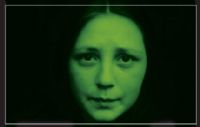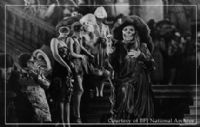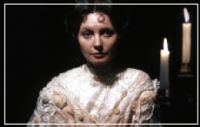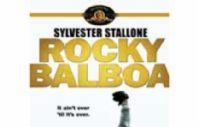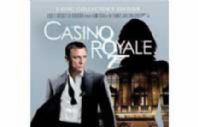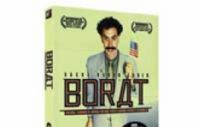Remastering The Macabre
Date: 19/11/2013
DVD Review
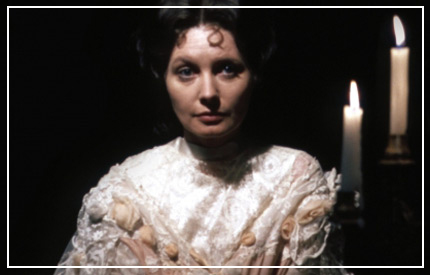
This month sees the British Film Institute (BFI) release the cult '70s BBC horror anthology series 'Supernatural' for the first time ever on DVD, giving horror fans insight into a long-lost period in British programme-making.
The show was initially broadcast in the summer of 1977 in the form of eight 50-minute episodes featuring stalwart tropes from the horror canon; vampires, ghosts, werewolves and zombies.
Supernatural saw the BBC adopt the 'classical' style of horror seen in 18th and 19th century Gothic novels and in the vast output of the British Hammer film studios.
The stories are set in mansions and castles and feature Lords and Ladies, Counts and Countesses and other such members of the upper classes. This Gothic aesthetic resonates even throughout the opening credits, which feature a backdrop of stone gargoyles and demons adorning an 18th Century church.
Each episode begins with a meeting of 'The Club of the Damned'; a fictitious group that invites prospective members to tell a macabre tale as an initiation rite. Approval results in membership; disapproval results in death.
The Beeb's selection of actors for 'Supernatural' would not have been out of place in a Royal Shakespeare Company casting call. Almost all of the central characters are played in a typically British, polysyllabic Elizabethan style by actors such as Ian Hendry, Billie Whitelaw, Denholm Elliot and Robin Hardy, the latter starring in the first episode; 'Ghosts of Venice'.
The story follows a troubled actor who travels to the Italian city with the purpose of reclaiming a purse that had been stolen from him while on tour during his heyday. The audience witnesses the crumbling sanity of a once-respected and revered classical actor, who must confront a secret from his past that had hitherto lain dormant.
The second story in the anthology is a two-parter, concerning a group of gentlemen who assemble at a castle in Hungary to dine with Countess Ilona, a woman who had at one time been a lover to each of them. However, it soon becomes apparent that the Countess has not forgiven the men for their past treatment of her, and that the rumours of her werewolf husband might not be a mere fairytale.
The fourth episode, 'Mr Nightingale', follows the titular character in his youth, as he travels to Hamburg to negotiate a business deal with the husband and father of a humble German family. But when he is visited by a spectre of his own likeness that only he can see, it seems Mr Nightingale is losing his sanity, and that his visions could have disastrous consequences for his hosts.
'Lady Sybil' tells the story of an ageing widow and her two sons; one a doctor, the other an out-of-work composer with a gambling habit. Concerned with the footsteps she hears outside her door every evening, Lady Sybil begins to wonder whether her life is being threatened by a nightly intruder, or whether the danger is somewhat closer to home.
In Viktoria, a wheelchair-bound lady is left to die by her husband, who promptly remarries and returns from Hungary home to England to live with his new wife and young daughter. But the family's elderly Hungarian maid blames the husband for the death of her mistress and sends a doll named Viktoria as a present for his daughter. As the girl becomes increasingly attached to her new companion, the adults begin to wonder if the doll is as innocent as it seems, or if something more sinister is afoot.
'Night Of The Marionettes' follows a famous biographer of the poet Percy Shelley, who travels with his family to a guest house in Switzerland to follow in the footsteps of the writer and his wife, Mary Shelley. As he learns more about the guest house, its owners it and their eerily lifelike marionette show, he revisits the story of Frankenstein, which had been written by Mary Shelley following a visit to the area. He uncovers a secret one night that leads him to wonder if the story of the reanimated corpse was indeed a work of fiction, or whether its origins are based closer to reality.
Dorabella is an eerie take on the classic vampire tale, in which a young man and his travelling companion are bewitched by a beautiful woman, who only shows herself at night. When they complete their journey and finally reach Dorabella's abode, the true nature of her family and race is revealed, with tragic consequences.
It is difficult to imagine what the reaction might have been to a show of this nature in the late seventies, as at this stage the notion of Gothic, other-worldly macabre was being forsaken for more realist, modern horror from North America and Europe.
Tales of aliens from outer space and Victorian vampires from eastern Europe were declining; making way for films depicting modern young Americans being slashed by modern, American serial killers.
At the time the show was released, Tobe Hooper's controversial cannibal classic The Texas Chainsaw Massacre was already three years old, while John Carpenter's Halloween would begin filming just a year later.
It was also the era of gore-heavy Euro horror from the likes of Mario Bava, Dario Argento and Lucio Fulci; filmmakers who had no qualms in depicting agonisingly squeamish, bloody setpieces filled with gallons of blood and pigs' offal guts.
So, quite what a British audience might have made of an anthology of stories that barely crosses the line from drama into horror, is anyone's guess.
'Supernatural', as a horror programme, is somewhat supressed throughout in its lack of gore, the subdued handling of terror and suspense and its muted colour schemes.
All but one of the stories in the 'Supernatural' series were written by Robert Muller, the celebrated English dramatist and screenwriter. And while seven out of eight episodes is certainly no lightweight achievement by anyone's standards, undoubtedly the most creepy and effective of the stories is the work of the one other writer on the show, Sue Lake, who brings us the chilling tale of a possessed doll with a death wish.
The only other episodes that come anywhere near to the kind of goosebumps-inducing horror with which modern audiences will be more familiar are 'Night of the Marionettes' and 'Dorabella'.
Nevertheless, lovers of camp, RSC-era British acting from this period will be pleased by this DVD release to no end, as will nostalgia freaks who look fondly on a BBC of yore; one of cheap special effects, mechanical camera tricks and dodgy-looking sets.
The acting talent alone is enough to prop up the lack of any real, threatening or sustained terror; however it remains relatively inconceivable that younger horror fans fed on a diet of blood-soaked popcorn horror will find much to celebrate.
But the BFI's role is to endorse, promote and educate the UK and the world on the joys of British cinema and programme making. And with the release of a nostalgia-tinged series like Supernatural, it's safe to say it is more than fulfilling its remit.
The BFI will release 'Supernatural' on DVD on Monday 18 November.
Iain Todd
The show was initially broadcast in the summer of 1977 in the form of eight 50-minute episodes featuring stalwart tropes from the horror canon; vampires, ghosts, werewolves and zombies.
Supernatural saw the BBC adopt the 'classical' style of horror seen in 18th and 19th century Gothic novels and in the vast output of the British Hammer film studios.
The stories are set in mansions and castles and feature Lords and Ladies, Counts and Countesses and other such members of the upper classes. This Gothic aesthetic resonates even throughout the opening credits, which feature a backdrop of stone gargoyles and demons adorning an 18th Century church.
Each episode begins with a meeting of 'The Club of the Damned'; a fictitious group that invites prospective members to tell a macabre tale as an initiation rite. Approval results in membership; disapproval results in death.
The Beeb's selection of actors for 'Supernatural' would not have been out of place in a Royal Shakespeare Company casting call. Almost all of the central characters are played in a typically British, polysyllabic Elizabethan style by actors such as Ian Hendry, Billie Whitelaw, Denholm Elliot and Robin Hardy, the latter starring in the first episode; 'Ghosts of Venice'.
The story follows a troubled actor who travels to the Italian city with the purpose of reclaiming a purse that had been stolen from him while on tour during his heyday. The audience witnesses the crumbling sanity of a once-respected and revered classical actor, who must confront a secret from his past that had hitherto lain dormant.
The second story in the anthology is a two-parter, concerning a group of gentlemen who assemble at a castle in Hungary to dine with Countess Ilona, a woman who had at one time been a lover to each of them. However, it soon becomes apparent that the Countess has not forgiven the men for their past treatment of her, and that the rumours of her werewolf husband might not be a mere fairytale.
The fourth episode, 'Mr Nightingale', follows the titular character in his youth, as he travels to Hamburg to negotiate a business deal with the husband and father of a humble German family. But when he is visited by a spectre of his own likeness that only he can see, it seems Mr Nightingale is losing his sanity, and that his visions could have disastrous consequences for his hosts.
'Lady Sybil' tells the story of an ageing widow and her two sons; one a doctor, the other an out-of-work composer with a gambling habit. Concerned with the footsteps she hears outside her door every evening, Lady Sybil begins to wonder whether her life is being threatened by a nightly intruder, or whether the danger is somewhat closer to home.
In Viktoria, a wheelchair-bound lady is left to die by her husband, who promptly remarries and returns from Hungary home to England to live with his new wife and young daughter. But the family's elderly Hungarian maid blames the husband for the death of her mistress and sends a doll named Viktoria as a present for his daughter. As the girl becomes increasingly attached to her new companion, the adults begin to wonder if the doll is as innocent as it seems, or if something more sinister is afoot.
'Night Of The Marionettes' follows a famous biographer of the poet Percy Shelley, who travels with his family to a guest house in Switzerland to follow in the footsteps of the writer and his wife, Mary Shelley. As he learns more about the guest house, its owners it and their eerily lifelike marionette show, he revisits the story of Frankenstein, which had been written by Mary Shelley following a visit to the area. He uncovers a secret one night that leads him to wonder if the story of the reanimated corpse was indeed a work of fiction, or whether its origins are based closer to reality.
Dorabella is an eerie take on the classic vampire tale, in which a young man and his travelling companion are bewitched by a beautiful woman, who only shows herself at night. When they complete their journey and finally reach Dorabella's abode, the true nature of her family and race is revealed, with tragic consequences.
It is difficult to imagine what the reaction might have been to a show of this nature in the late seventies, as at this stage the notion of Gothic, other-worldly macabre was being forsaken for more realist, modern horror from North America and Europe.
Tales of aliens from outer space and Victorian vampires from eastern Europe were declining; making way for films depicting modern young Americans being slashed by modern, American serial killers.
At the time the show was released, Tobe Hooper's controversial cannibal classic The Texas Chainsaw Massacre was already three years old, while John Carpenter's Halloween would begin filming just a year later.
It was also the era of gore-heavy Euro horror from the likes of Mario Bava, Dario Argento and Lucio Fulci; filmmakers who had no qualms in depicting agonisingly squeamish, bloody setpieces filled with gallons of blood and pigs' offal guts.
So, quite what a British audience might have made of an anthology of stories that barely crosses the line from drama into horror, is anyone's guess.
'Supernatural', as a horror programme, is somewhat supressed throughout in its lack of gore, the subdued handling of terror and suspense and its muted colour schemes.
All but one of the stories in the 'Supernatural' series were written by Robert Muller, the celebrated English dramatist and screenwriter. And while seven out of eight episodes is certainly no lightweight achievement by anyone's standards, undoubtedly the most creepy and effective of the stories is the work of the one other writer on the show, Sue Lake, who brings us the chilling tale of a possessed doll with a death wish.
The only other episodes that come anywhere near to the kind of goosebumps-inducing horror with which modern audiences will be more familiar are 'Night of the Marionettes' and 'Dorabella'.
Nevertheless, lovers of camp, RSC-era British acting from this period will be pleased by this DVD release to no end, as will nostalgia freaks who look fondly on a BBC of yore; one of cheap special effects, mechanical camera tricks and dodgy-looking sets.
The acting talent alone is enough to prop up the lack of any real, threatening or sustained terror; however it remains relatively inconceivable that younger horror fans fed on a diet of blood-soaked popcorn horror will find much to celebrate.
But the BFI's role is to endorse, promote and educate the UK and the world on the joys of British cinema and programme making. And with the release of a nostalgia-tinged series like Supernatural, it's safe to say it is more than fulfilling its remit.
The BFI will release 'Supernatural' on DVD on Monday 18 November.
Iain Todd
More info : http://www.bfi.org.uk/


























